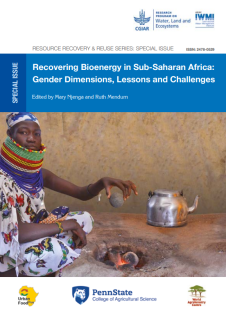
There is a strong link between gender and energy in view of food preparation and the acquisition of fuel, especially in rural areas. This is demonstrated in a range of case studies from East and West Africa, where biochar, human waste and other waste resources have been used to produce briquettes or biogas as additional high-quality fuel sources. The synthesis of the cases concludes that resource recovery and reuse for energy offers an alternative to conventional centralized grid projects which, while attractive to investors and large-scale enterprises, do not necessarily provide job opportunities for marginalized communities. Reusing locally available waste materials for energy production and as soil ameliorant (in the case of biochar) in small enterprises allows women and youth who lack business capital to begin modest, locally viable businesses. The case studies offer concrete examples of small-scale solutions to energy poverty that can make a significant difference to the lives of women and their communities.
***
About the Resource Recovery and Reuse Series
The Resource Recovery and Reuse (RRR) Series is published as part of the Rural–Urban Linkages research theme under the CGIAR Research Program on Water, Land and Ecosystems (WLE). The series is dedicated to presenting applied research on the safe recovery of water, nutrients and energy from domestic and agro-industrial waste streams. It targets development experts and others in the research for development continuum. The Rural–Urban Linkages research theme addresses the interlinked challenges of growing urbanization, food demand and waste management from a landscapes and territorial perspective. By promoting improved rural-urban food systems and governance—and by turning waste into usable products like fertilizer, irrigation water, and fuel—this research theme increases water- and nutrient-use efficiency at a systemic level, while improving urban resilience, food security and nutrition, and vibrant food economies. The program works closely with the World Health Organization (WHO), Food and Agriculture Organization of the United Nations (FAO), United Nations Environment Programme (UNEP), United Nations University (UNU) and many national and international partners across the globe.
